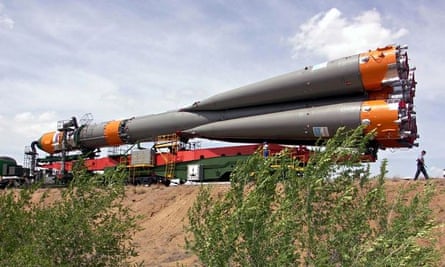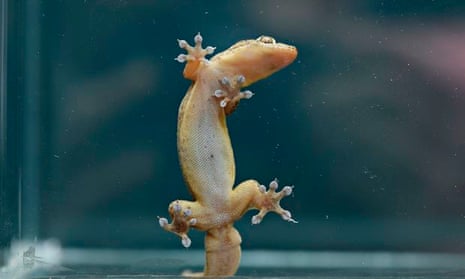Russia’s space agency on Monday confirmed that five geckos, launched into space for an experiment on weightlessness and sexual behavior, have died.
The federal space agency released a statement saying the landing apparatus of the Photon-M satellite had returned to earth as planned, falling into Russia’s Orenburg region at 1.18pm Moscow time, and that the entire herpetological crew had perished at some point during their odyssey. With four female lizards and one male on board, Russian scientists had hoped to learn how zero gravity would affect the sexual habits of geckos.
A representative at the Institute of Biomedical Problems (ISTC), which participated in the experiment, explained to Russian news agency Itar-Tass simply said: “It’s still too early to talk about the geckos’ cause of death.” A source in a scientific commission involved later told the Interfax wire service that “According to the preliminary information, it became clear the geckos froze. Most likely, this happened due to a failure of the equipment meant to ensure the temperature of the box with the animals.”
He continued: “The geckos could have died at any stage of the flight, and it’s impossible to judge when based on the animals’ mummified remains.”
The space agency statement said simply that a “preliminary examination” found the geckos dead, and that “the date and conditions of their deaths will be determined by specialists”.
A source “who took part in securing the lander” told Interfax that “as usually happens in such instances, [the space agency] will soon appoint an emergency commission to find out these animals’ cause of death”.
An experiment with fruit flies was successful, the insects surviving and breeding, according to the space agency. The satellite also carried mushrooms and seeds, meant for tests related to gravity and radiation; all such biological material is being transported to labs for further inspection.
In July, Russia reported that it had lost contact with the satellite, and scientists were concernd that life-support systems could fail, leaving the geckos to die from hunger within three months, according to Interfax. A few days later, the space agency said it had re-established communications and that the experiment was back on track.

ISTC scientists told Itar Tass that loss of contact with the satellite should not have disturbed the animals’ support systems, and that geckos’ metabolisms, which are low relative to humans’, and sticky feet should counteract the effects of weightlessness.
Russia’s storied space program has had a troubled recent past, especially in the wake of poor relations with the US and Nasa. Two rockets have crashed and an Angora rocket launch was aborted since President Vladimir Putin’s May announcement that the government would invest $52bn in the space program.
Gerbils, newts, spiders, butterflies, snails and bacteria all successfully traversed the cosmos in 2007, when international scientists launched them from Russia for a set of 45 experiments.




Comments (…)
Sign in or create your Guardian account to join the discussion